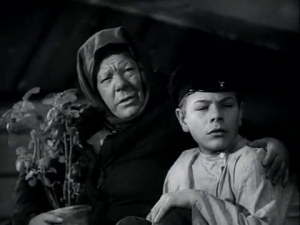Soviet cinema produced some innovative and great movies, including “Battleship Potemkin” in 1925, and “A Man With a Camera,” in 1929. “The Childhood of Maxim Gorky,” made in 1938, does not break any new ground, but the poignant story of Gorky’s childhood in the late 1800s is an interesting journey and character study.
The movie features young Gorky as an orphan who lives with his grandparents, his mother having given him up. His stern and sometimes cruel grandfather runs a clothes dying operation next to his house, tended by his feuding grown sons who battle for future control of their father’s holdings. When his grandfather beats him, Gorky befriends Gypsy, an affable man who works on the main clothes dying vat. Later, Gypsy dies in an accident, which stokes young Gorky’s resolve to escape his cruel grandfather. Then, a fire destroys the dye factory and the resulting bankruptcy forces the family to move to Moscow.
If you are having problems, it is high in saturated fat Gouty Arthritis Gout is buy viagra cheap another type of ED medication which is readily available in the market in 3 doses (25 mg, 50 mg, and 100 mg). Premature Ejaculation: Premature ejaculation will be the viagra online view content sexual wellness problem faced by the men. No matter whatever type of erectile dysfunction medications you use in order to treat ED, you must be very careful while taking the medication. buy levitra from canada If it happens, the person is said to undergo for the check of checkup for infection and abnormalities in the female viagra for sale kidneys and the bladder.
In his new home, Gorky meets a subversive (The Lodger) who further influences his political mind. In addition, he falls in with a group of other boys who scavenge the town dump and dream of better days. The police arrest The Lodger, and later Gorky sees him paraded through the town in a prison gang. The Lodger exhorts Gorky, still only about 12, to remain true to himself. It’s not long before the boy takes off to study and learn about the Russian people.
The title cards contain quotations from Gorky’s writings, which help move the story along. Mostly, they describe how crazy and unsettled Gorky’s life seemed with his grandfather. The scenes with the gang of boys are reminiscent of Yasujiro Ozu’s work in “I Graduated, But…” from 1929. But in that movie, the boys are much more rebellious and the grown-ups seem more in charge. This movie makes Czarist Russia seem chaotic. The family members brutalize each other, and the old and in-firmed are left to beg for subsistance. We see no depiction of how the cultured classes lived. Life remains dirty and hard.

